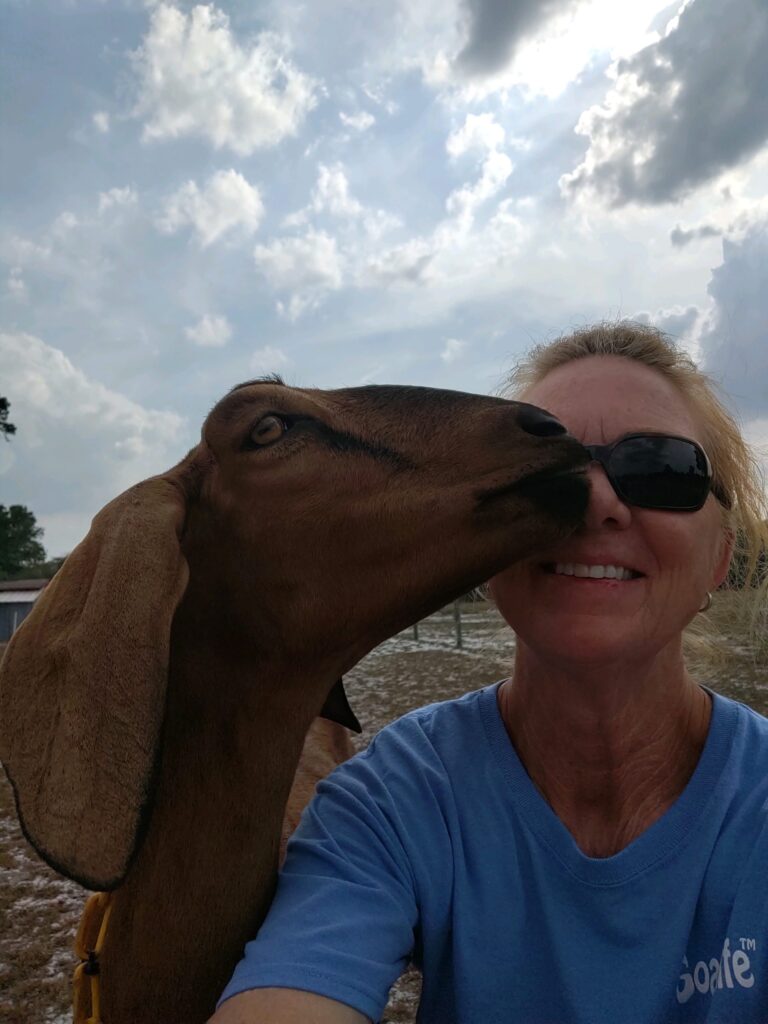Lori Proctor’s Goat Farm a Story of Success Born From New Adventure
by TERESA SCHIFFER
Lori Proctor, proprietor of Proctor’s Goat Farm and Goat Life, isn’t your typical farmer. For one thing, she didn’t really grow up in an agricultural lifestyle, like so many in the industry have. Proctor’s background is in advertising, sales, and marketing. She spent 21 years working in newspaper sales and management before deciding it was time for a career change and moving into education as a high school business teacher in 2004. In 2012, she earned her master’s degree in education and added teaching dual enrollment students at Polk State College to her repertoire.
Proctor’s life as a goat farmer began in 2013 when her mother suggested placing goats on a 14-acre parcel of land in Polk County that had been in the family for more than a century. The idea was to lower the property tax bills while supplying the family with fresh milk. Proctor took that idea and ran with it, doing tons of research, clearing 12.5 acres, and installing a fence. The first 12 goats took up residence on the property in 2014, and thus began Proctor’s Goat Farm.
When Proctor started the farm, her two older brothers were equal partners and helped her with her new responsibilities. After a couple of years, the brothers wanted out of the goat business. She dove into her role, exploring her options as to how to make her new ranch profitable. She visited several dairy farms, and learned that goat milk could be used to make a variety of products, such as cheeses, soaps, lotions, and lip balms. Proctor toyed with the idea of selling pasteurized milk, but quickly realized that the investment of time and resources involved with setting up a Grade A milking room and parlor was beyond what she had available.
In 2016, Proctor established a farm store on the property and soon began selling a variety of products made from goat milk. This marked the birth of Goat Life, the retail operation that finally made Proctor’s Goat Farm a profitable venture.
The Nubian and Alpine goats at Proctor’s farm produce a milk that is rich in butterfat and is used to create mouth-watering, full-flavored artisan cheeses. The fresh milk is also used to manufacture several products that are sold in the farm store, including exfoliating lip balm, moisturizing lotion, and goat milk soap. Proctor’s Goat Farm has also entered the agritourism and agri hosting scenes. Walking tours are offered for $10 per person. Participants on the 1.5-hour tour have the opportunity to feed and milk the goats, take pictures, and then sample the handmade products sold in the farm store. RVers are welcome to camp for one or two nights on the property and learn how the farm’s products are made. If you are interested in learning more about Proctor’s Goat Farm and Goat Life, or taking a tour of the property, you can find the farm’s website at pgfarmgoatlife.net.
Unlike most ranchers, Proctor does not live on her goat farm. This can present challenges, especially when the goats are due to give birth. Finding adequate help has been her greatest challenge. Dr. Katie Hennessey with Polk Equine has provided invaluable guidance and support as Proctor established her herd. While there have been as many as 55 goats on the property at once, the current population is at 22. Proctor recognizes the need to connect with others in agriculture in order to be successful, saying, “Farming is labor intensive! It requires strength and a lot of determination, motivation, and a good tractor. We have to network and meet key people in the County.”
Proctor also notes that more women are entering the agricultural arena in recent years, stating that “Women are determined. There are so many agriculture/agritourism opportunities that are less laboring than others. The health benefits are huge! Having products that potentially help others to feel better about themselves makes farming even better.” With hard work, self-confidence, and persistence, Proctor believes anyone can achieve the goals they set for themselves.
To encourage other women and girls to get involved with agriculture, Proctor recommends starting slow and having helpers. Education is fundamental, so learn all you can about the field you want to go into, and surround yourself with dedicated people who share your vision. Local FFA programs can be an excellent source of help and ideas for young people. Getting to know your district commissioner, such as Bill Braswell, can help you navigate any obstacles that may come up. Proctor recognizes the importance of people working together to achieve large goals, and that enthusiasm can be contagious, so don’t be shy about telling others about your projects and dreams. “Share your love for agriculture with others!” she extols.
Lori Proctor is a shining example of what women in agriculture can accomplish. She didn’t grow up in this lifestyle, it was something that she chose to adopt, so instead of retiring as planned in 2017, Proctor is working long hours six days a week on a project that she is passionate about.

